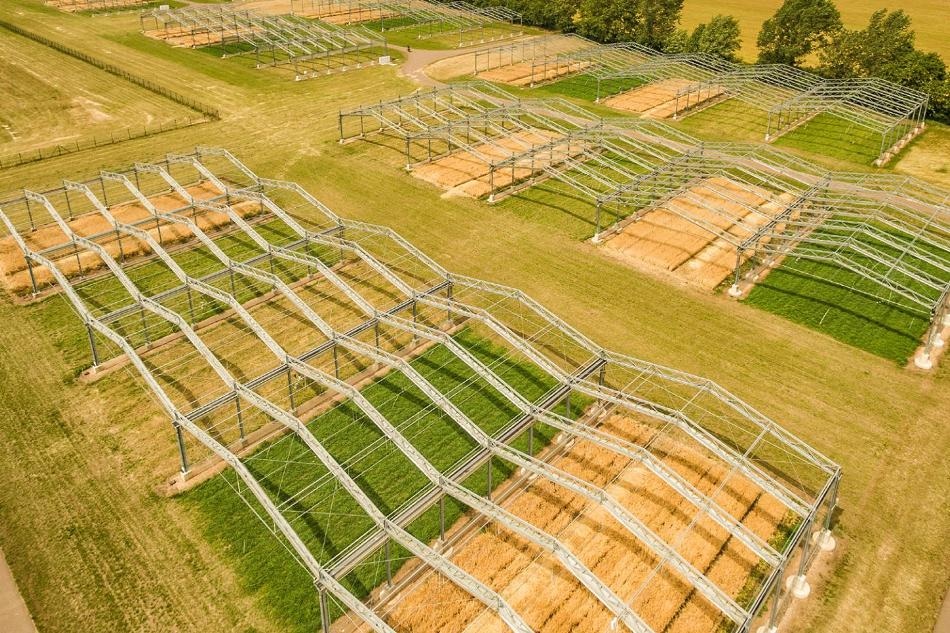Sep 17 2019
When it comes to the effect of climate change on ecosystems, there are still large gaps in knowledge. A majority of experiments are impractical as they do not match the projected climate scenarios for a particular region.
 In the Global Change Experimental Facility (GCEF), a field experiment in Saxony-Anhalt operated by the Helmholtz Centre for Environmental Research (UFZ), scientists have been researching the consequences of the climate and land use changes to be expected in the future since 2013. (Image credit: ©André Künzelmann/UFZ)
In the Global Change Experimental Facility (GCEF), a field experiment in Saxony-Anhalt operated by the Helmholtz Centre for Environmental Research (UFZ), scientists have been researching the consequences of the climate and land use changes to be expected in the future since 2013. (Image credit: ©André Künzelmann/UFZ)
Consequently, there is no dependable data on how ecosystems may look like in the future, as a team of biodiversity scientists from Central Germany revealed in the journal “Global Change Biology.”
The researchers studied all experimental information on the subject. They are currently seeking the introduction of standard protocols for future experiments.
The fact that climate change is caused by man and that it will change ecosystems is undeniable. However, there is a disagreement about its degree and its consequences.
In order to predict how plant communities will react to climate change and what ecosystems of the future will look like, we need realistic field experiments worldwide.
Humboldt Professor Tiffany M. Knight from Martin Luther University Halle-Wittenberg (MLU) and the Helmholtz Centre for Environmental Research (UFZ)
She leads the group “Spatial Interaction Ecology” at the German Centre for Integrative Biodiversity Research (iDiv) Halle-Jena-Leipzig. According to Knight, field experiments are an essential tool for comprehending the effects of climate on plant communities.
“Nature is complex and plant communities are structured by many interacting environmental factors. Experiments can specifically isolate the role of climate factors, such as precipitation and temperature,” said Knight.
The scientists undertook an elaborate literature review on the topic, looking for field experiments on the association between plant communities and climate factors. “In these experiments, temperature and precipitation are altered to investigate their effects on the plant community,” explained Dr Lotte Korell, a member of Knight’s research group and lead author of the study.
The scientists were able to locate a total of 76 studies that manipulated either temperature, precipitation, or both.
“We were surprised to find that most of the studies were not based on the actual climate forecasts for the specific geographical regions. In many cases they were not even close,” stated Korell. According to her, this disparity between the climate manipulations in field experiments and climate projections for the regions is because of numerous factors.
A number of the experiments were arranged to look into questions irrelevant to climate change, or were set up before more accurate climate projections were available for certain regions.
There's nothing wrong with the science in those experiments. They are just not suited to answer the questions we are now asking.
Tiffany M. Knight, Humboldt Professor, MLU
Based on the region, present climate models project variations in precipitation of up to 25% and higher temperatures of up to 5 °C. However, nearly all of the studies examined by the team manipulated plenty of extreme variations in precipitation, with values ranging from –100% to +300%. On the other hand, the temperature experiments underestimated the climate forecasts for the worst-case scenario.
This is why we don’t have the data we need to forecast and plan for our future. There is too little known about how ecosystems will react to climate change and how we can best manage our natural ecosystems to maintain the functions that are critical to humanity.
Dr Lotte Korell, Study Lead Author, Spatial Interaction Ecology Group, MLU
For instance, it is uncertain whether ecosystems react steadily to a varying climate or whether there are thresholds at which ecosystems react in a dramatic or even unanticipated way. The researchers are, thus, proposing the establishment of international protocols that can be used to carry out climate experiments based on accurate projections.